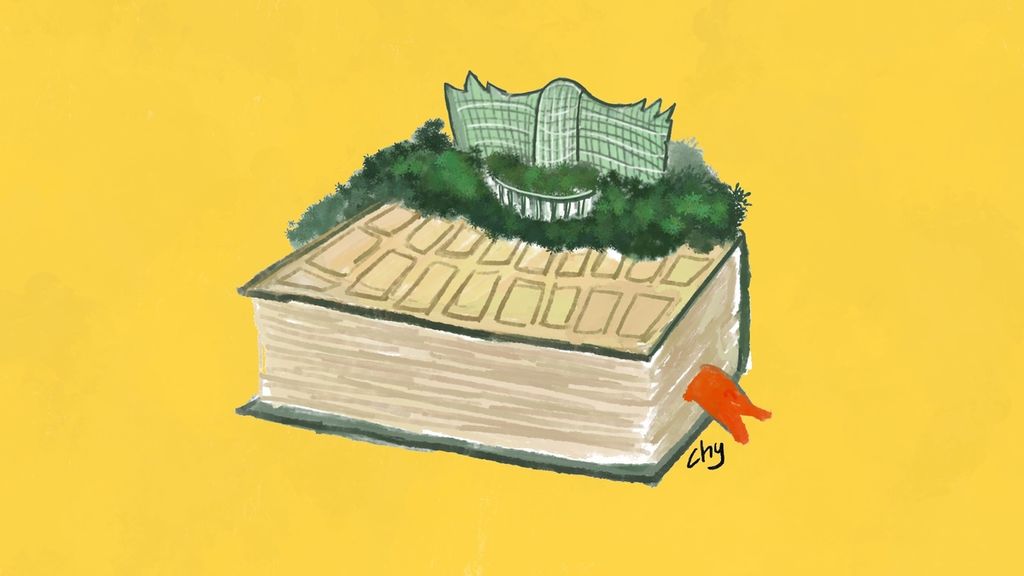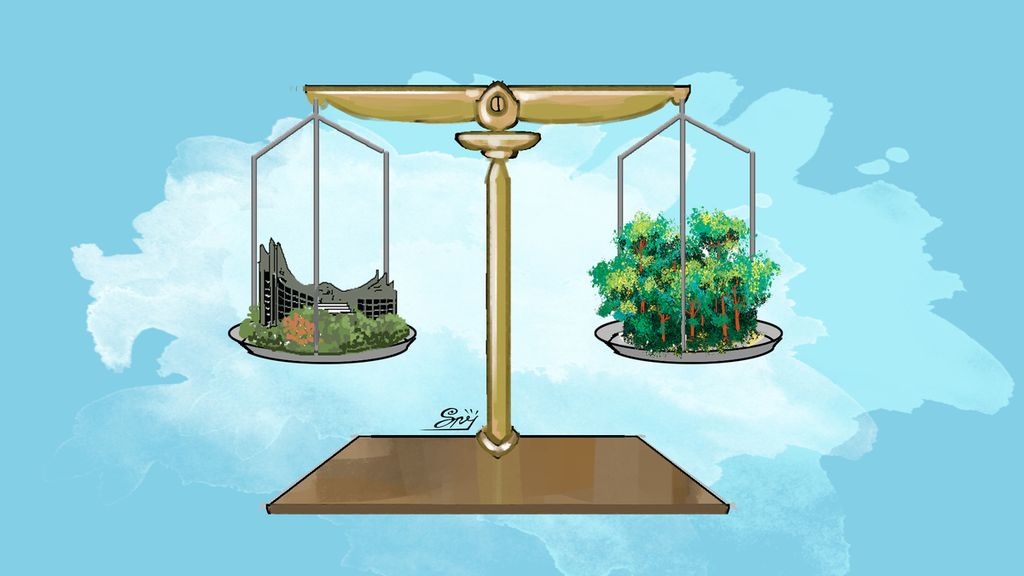Land Rights in IKN
Implementing the ideas in the formulation of laws and regulations requires an in-depth and comprehensive understanding of the conceptions and principles/principles of land law based on the Agrarian Law .

Following the issuance of Government Regulation No. 12/2023, disagreements grew regarding stipulations about the rights to cultivate (HGU), the rights to build (HGB) and the rights to utilize (usufructuary rights) the land under the Authority of the Indonesian Capital City (OIKN), which if not clarified will be lengthy and counterproductive.
The Government Regulation concerning the granting of business permits, ease of doing business, and investment facilities for businesses in the IKN was issued on 6 March 2023.
In order to understand objectively the arrangements regarding the HGU period of 95 years to 190 years and the rights to use (usufructuary rights, HGB) for 80 years to 160 years, as stipulated in Articles 18, 19 and 20 of PP No 12/2023, the conceptual foundation must be found in the philosophy, conception and principles of Law No. 5/1960 concerning Basic Agrarian Regulations (UUPA).
Also read:
> IKN, Organization and ‘Reverse Policy’
> National Capital, Some Notes
Considering that the author is of the opinion that the arrangement regarding the granting of HGU over land in the management rights (HPL) introduced by Law No. 11/2020 concerning Job Creation contradicts the conception of the occurrence of HGU according to the UUPA, the following explanation is expected to end the polemic about the term of HGU/HGB/usage rights over the OIKN's HPL land.
Whether that period is 95 years or 80 years, even 190 years or 160 years. The main issue is whether the time period for land rights is granted directly (automatically) or gradually (cumulatively)?
Crucial phrase
Stipulations regarding the land rights (HGU/HGB/usufructuary rights) on the OIKN land management rights are regulated in Articles 18, 19 and 20 of PP No 12/2023.
In essence, these articles regulate, first, the time period for land rights to be granted as a maximum of 95 years (HGU) or 80 years (HGB and usufructuary rights), through the first cycle with the following stages: the granting of rights, a maximum of 35 years (HGU) or 30 years (HGB and Right to Use); the extension of rights, a maximum of 25 years (HGU) or 20 years (HGB and usufructuary rights); the renewal of rights, a maximum of 35 years (HGU) or 30 years (HGB and usufructuary rights).
Second, the HGU or HGB and usufructuary rights granted for the first cycle with a maximum period of 95 or 80 years are stated in the decision on the granting of rights and are recorded in the HGU/HGB/usage rights certificate.
Third, the extension and renewal of HGU/HGB/usufructuary rights are given simultaneously after five years of effective use and/or utilization.

Fourth, 10 years before the end of the first cycle of land rights, an application for land rights can be submitted again for a second cycle with a period of 95 years (HGU) or 80 years (HGB and usufructuary rights).
Fifth, the application for the return of land rights for the second cycle must meet certain criteria.
Sixth, the extension and renewal of land rights in the first cycle and the return of land rights in the second cycle are given after a joint evaluation between OIKN and the Agrarian and Spatial Planning Ministry/National Land Agency (ATR/BPN).
Seventh, the extension and renewal of land rights in the first cycle and the return of land rights in the second cycle are “loaded” in the HGU/HGB/usufructuary rights certificate.
The words recorded in the certificate and included in the certificate, without explanation in the Elucidation of PP No 12/2023, open opportunities for various interpretations to arise. First, what is the meaning recorded in the certificate? If this is interpreted as a recording of the decree on the extension and renewal of HGU/HGB/usage rights, then this will not cause any problems. However, if the word recorded is interpreted as registration for extension and renewal of HGU/HGB/usage rights at the same time, then this violates Constitutional Court Ruling No 21-22/PUU-V/2007).
Also read:
> Strategic Role of Nusantara as Indonesia’s New Capital
> One Night in New Capital City and President's Optimism
It should be understood that the decree on extension and renewal of rights is a promise or guarantee that land rights will be extended and renewed when land rights expire if all conditions/criteria are met. As a promise, the decree (SK) is binding on the parties issuing and receiving the SK, but not yet binding on third parties. Extension and renewal of nascent land rights (takes effect) and binding on third parties when registered or recorded on a certificate "since the expiration date of land rights" (Maria Sumardjono, Pushing the 90 Year HGU, Kompas, 5/10/2020 ). Without adding the phrase since the expiry date of land rights, the provisions concerning the extension period and renewal of land rights in PP No 23/2023 violate the Constitutional Court's ruling.
Second, it is not clear what is meant by the word contained in the HGU/HGB/usufructuary rights certificate. Does it have the same meaning as the word recorded? If they are considered the same, without being followed by the phrase since the expiration of land rights, this formulation contradicts the Constitutional Court's ruling.
What is the importance of affixing the phrase from the expiration date of the land right after the phrase is recorded in the HGU/HGB/usufructuary rights certificate? Without affixing that phrase, the term of the HGU/HGB/usufructuary rights on the OIKN HPL land is interpreted as being given directly. This means that the 95 or 80 year period applies automatically because even though the granting of the first land rights has not ended, it has been followed by simultaneous registration of the extension and renewal of the rights. This clearly violates the Constitutional Court's decision.

End disagreements
Implementing the ideas in the formulation of these laws and regulations requires an in-depth and comprehensive understanding of the conceptions and principles/principles of land law based on the Agrarian Law so that non-conceptual disagreements can be avoided. Especially if it causes turmoil.
In order to minimize the various conflicting interpretations, two things need to be considered. First, that the regulation regarding the granting of extension and renewal of land rights as outlined in the decree is not something new. This has been regulated since deregulation in October 1993 and was continued through PP No. 40/1996 which was later replaced by PP No. 18/2021.
The granting of the extension and renewal of land rights as outlined in the decree does not conflict with the UUPA conception and does not violate the Constitutional Court's decision. The reason is that the decree is a promise that can only be realized when it is registered and if all requirements are met and an evaluation has been carried out.
Also read:
> Is 60-year-old UUPA Still Relevant?
> The Unending Agrarian Conflicts
Efforts to extend and renew land rights at the same time as contained in the decree constitute an administrative simplification and not a deviation from the conception.
If there is no change in subject and object, the land is used according to the purpose of granting the rights, and is still in accordance with the spatial plan and is not taken for the public interest, then there is no need to remeasure and arrange other administrative requirements to obtain an SK extension and renewal of land rights.
The extension and renewal of the respective land rights are registered at the expiration of the land rights at each stage.
The mention of the words included in the certificate of land rights needs to be corrected so that it is in sync with the previous formulation.
Second, to emphasize that the period of HGU/HGB/usufructuary rights in PP No 12/2023 does not violate the Constitutional Court's decision, it is necessary to refine the formula by adding the phrase “since the expiration date of land rights after the phrase is recorded in the certificate. HGU/HGB/usufructuary rights."
This is intended to emphasize that the registration of extension and renewal of land rights is carried out in stages.
Likewise, the mention of the words included in the certificate of land rights needs to be corrected so that it is in sync with the previous formulation. Correction or improvement of the regulatory formula regarding the HGU/HGB/usufructuary rights period in PP No. 12/2023 is needed so as not to violate the Constitutional Court's ruling.
This effort should be formulated in a ministerial regulation, which is the implementation regulation of PP No 12/2023. If this is not pursued, the stakes are that there is no guarantee of legal certainty that leads to various impacts.

Maria SW Sumardjono
Maria SW Sumardjono, Professor of the Faculty of Law, Gadjah Mada University, and Member of the Indonesian Academy of Sciences
This article was translated by Kurnia Siswo.